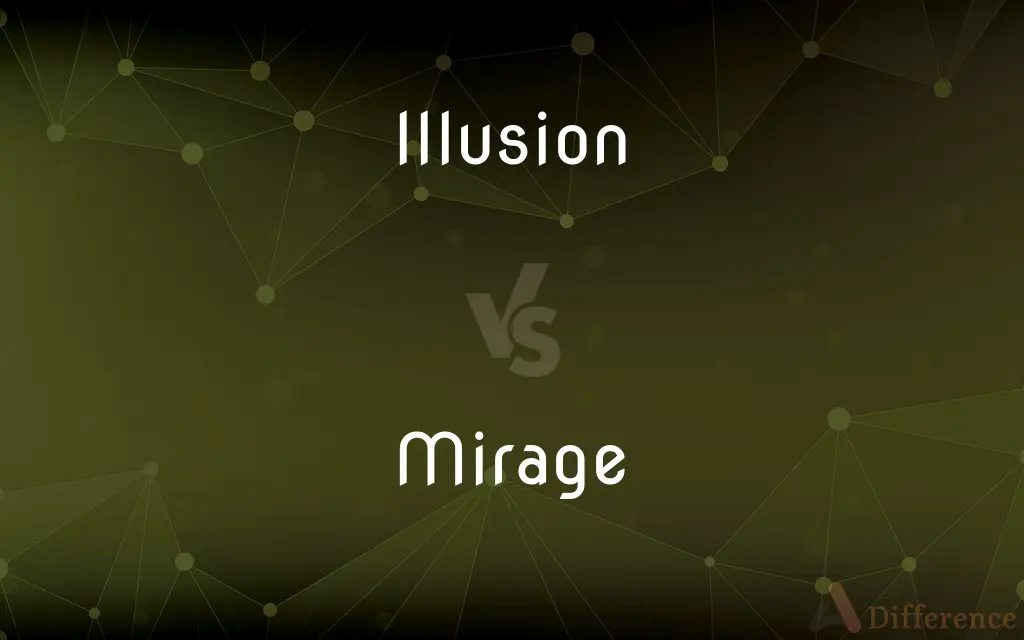Illusion vs. Mirage — What's the Difference?
By Tayyaba Rehman — Updated on September 13, 2023
An illusion is a deceptive perception or belief, while a mirage is an optical phenomenon where distant objects appear displaced, often seen in deserts or hot roads.

Difference Between Illusion and Mirage
Table of Contents
ADVERTISEMENT
Key Differences
An illusion pertains to a broad range of deceptive perceptions or beliefs, not restricted to the sense of sight. It can be a trick played by the mind, where something appears differently than it is, be it a visual, auditory, or other sensory deception. A mirage, on the other hand, is specifically an optical illusion caused by atmospheric conditions. It's a result of the refraction of light, which causes an object to appear displaced from its true position.
Illusions can be intentional or unintentional. Magicians, for example, create visual illusions to entertain, and auditory illusions might be used in music or sound design. Mirage, conversely, is a natural occurrence, often seen in deserts or on hot roads. When light rays bend due to temperature variations in the air, mirages make distant objects appear closer, or even create the illusion of water on the ground.
Furthermore, while the term "illusion" can be used metaphorically to denote false beliefs or ideas about a situation ("living under the illusion of safety"), "mirage" is less flexible in its usage, primarily denoting the optical phenomenon. However, it can occasionally be used metaphorically to refer to something unattainable or illusory ("the mirage of success").
In essence, all mirages are illusions, but not all illusions are mirages. An illusion can encompass any misleading perception across our senses, while a mirage is strictly visual, stemming from natural light refraction due to atmospheric conditions.
Comparison Chart
Definition
A deceptive perception or belief.
An optical illusion due to atmospheric conditions.
ADVERTISEMENT
Cause
Can be psychological, optical, or sensory.
Caused by the bending of light rays in the atmosphere.
Scope
Broad, encompasses all senses.
Specific to visual perception.
Usage
Can be used metaphorically or literally.
Primarily denotes the optical phenomenon, rarely used metaphorically.
Example
Magician's tricks, auditory deceptions.
Images of water in the desert or an object appearing displaced.
Compare with Definitions
Illusion
A thing that seems to be something it's not.
On stage, the actor's disguise was a perfect illusion.
Mirage
Something that appears real but isn't.
The dream of wealth turned out to be a mirage.
Illusion
A false idea or belief.
He was under the illusion that she cared.
Mirage
An unattainable or illusory prospect.
For many, the perfect life is a mirage.
Illusion
A perception that misrepresents reality.
The drawing created an optical illusion of a 3D object.
Mirage
The displacement of a distant object due to light refraction.
The road ahead seemed wet, but it was just a mirage.
Illusion
An illusion is a distortion of the senses, which can reveal how the human brain normally organizes and interprets sensory stimulation. Although illusions distort our perception of reality, they are generally shared by most people.Illusions may occur with any of the human senses, but visual illusions (optical illusions) are the best-known and understood.
Mirage
A phenomenon where things appear differently from their actual position.
The mountain's mirage made it seem closer than it was.
Illusion
An erroneous perception of reality
Mirrors gave the illusion of spaciousness.
Mirage
An optical illusion caused by atmospheric conditions.
He saw a mirage of an oasis in the desert.
Illusion
An erroneous concept or belief
The notion that money can buy happiness is an illusion.
Mirage
A mirage is a naturally-occurring optical phenomenon in which light rays bend via refraction to produce a displaced image of distant objects or the sky. The word comes to English via the French (se) mirer, from the Latin mirari, meaning "to look at, to wonder at".Mirages can be categorized as "inferior" (meaning lower), "superior" (meaning higher) and "Fata Morgana", one kind of superior mirage consisting of a series of unusually elaborate, vertically stacked images, which form one rapidly-changing mirage.
Illusion
The condition of being deceived by a false perception or belief
Spent months flailing about in illusion.
Mirage
An optical phenomenon that creates the illusion of water, often with inverted reflections of distant objects, and results from distortion of light by alternate layers of hot and cool air. Also called fata morgana.
Illusion
Something that is erroneously perceived or construed
The animal in the shadows turned out to be an illusion.
Mirage
Something illusory or insubstantial.
Illusion
A fine transparent net fabric, used for dresses or trimmings.
Mirage
An optical phenomenon in which light is refracted through a layer of hot air close to the ground, often giving the illusion of a body of water.
Optical illusion
Fata Morgana
Illusion
(countable) Anything that seems to be something that it is not.
We saw what looked like a tiger among the trees, but it was an illusion caused by the shadows of the branches.
Using artificial additives, scientists can create the illusion of fruit flavours in food.
Mirage
(figuratively) An illusion.
Illusion
(countable) A misapprehension; a belief in something that is in fact not true.
Jane has this illusion that John is in love with her.
Mirage
(transitive) To cause to appear as or like a mirage.
Illusion
(countable) A magician’s trick.
Mirage
An optical effect, sometimes seen on the ocean, but more frequently in deserts, due to total reflection of light at the surface common to two strata of air differently heated. The reflected image is seen, commonly in an inverted position, while the real object may or may not be in sight. When the surface is horizontal, and below the eye, the appearance is that of a sheet of water in which the object is seen reflected; when the reflecting surface is above the eye, the image is seen projected against the sky. The fata Morgana and looming are species of mirage.
By the mirage uplifted the land floats vague in the ether,Ships and the shadows of ships hang in the motionless air.
Illusion
(uncountable) The state of being deceived or misled.
Mirage
An optical illusion in which atmospheric refraction by a layer of hot air distorts or inverts reflections of distant objects
Illusion
An unreal image presented to the bodily or mental vision; a deceptive appearance; a false show; mockery; hallucination.
To cheat the eye with blear illusions.
Mirage
Something illusory and unattainable
Illusion
Hence: Anything agreeably fascinating and charming; enchantment; witchery; glamour.
Ye soft illusions, dear deceits, arise!
Illusion
A sensation originated by some external object, but so modified as in any way to lead to an erroneous perception; as when the rolling of a wagon is mistaken for thunder.
Illusion
A plain, delicate lace, usually of silk, used for veils, scarfs, dresses, etc.
Illusion
An erroneous mental representation
Illusion
Something many people believe that is false;
They have the illusion that I am very wealthy
Illusion
The act of deluding; deception by creating illusory ideas
Illusion
An illusory feat; considered magical by naive observers
Illusion
A deceptive appearance.
The room's design gave an illusion of space.
Illusion
Something likely to be wrongly perceived.
The mirror created an illusion of depth.
Common Curiosities
Why do mirages often appear in deserts?
Mirages often occur in deserts due to the bending of light rays caused by temperature variations in the air.
Are all illusions visual?
No, illusions can involve any of the senses, while a mirage is visual.
Is a mirage a type of illusion?
Yes, a mirage is a specific type of optical illusion caused by atmospheric conditions.
Can you touch a mirage?
No, a mirage is an optical phenomenon, and it cannot be touched or interacted with physically.
Can illusions be auditory?
Yes, illusions can be auditory, visual, or even tactile, whereas mirages are strictly visual.
Can an illusion be intentional?
Yes, illusions can be intentionally created, like in magic tricks or art, while mirages occur naturally.
Is the term 'illusion' used metaphorically?
Yes, "illusion" can be used metaphorically to describe false beliefs or perceptions, while "mirage" is less frequently used in a metaphorical sense.
How are illusions used in entertainment?
Illusions are often used by magicians, filmmakers, and artists to deceive or entertain the audience.
Are illusions always deceptive?
While many illusions can be deceptive, some are intentionally created for entertainment or artistic purposes.
What causes an illusion?
Illusions can be caused by various factors, from sensory deception to psychological reasons or environmental conditions.
Is a mirage a trick of the mind?
No, a mirage is an optical phenomenon due to atmospheric conditions, not a psychological trick.
Why do mirages look like water on the road?
The bending of light rays due to atmospheric conditions can create the illusion of water or a shimmering surface.
Can you predict when a mirage will occur?
It's challenging to predict precisely when a mirage will occur, but they're more likely in conditions with significant temperature variations.
Is seeing a mirage common?
Mirages are common in specific conditions, like on hot roads or in deserts, due to the bending of light by the atmosphere.
Can a mirage be dangerous?
While a mirage itself isn't harmful, it can be misleading, especially to travelers in deserts who might mistake it for a water source.
Share Your Discovery

Previous Comparison
Alto vs. Tenor
Next Comparison
Tunic vs. TopAuthor Spotlight
Written by
Tayyaba RehmanTayyaba Rehman is a distinguished writer, currently serving as a primary contributor to askdifference.com. As a researcher in semantics and etymology, Tayyaba's passion for the complexity of languages and their distinctions has found a perfect home on the platform. Tayyaba delves into the intricacies of language, distinguishing between commonly confused words and phrases, thereby providing clarity for readers worldwide.














































